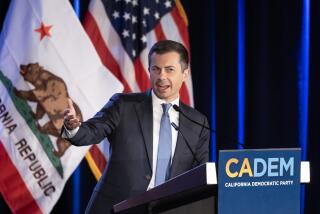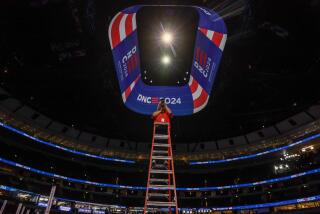Talk about your PC convention
- Share via
Over the next couple of weeks, we -- not ordinary-people we but big-money folks -- are splashing out about $120 million to stage two national political conventions. The Democrats convene in Denver, the Republicans in St. Paul, where delegates will confab and holler, drink and eat, collect swag and, oh yes, formally nominate a candidate.
It’s all so 20th century. Let’s make 2008 the last real-time hurrah. By 2012, we should be staging virtual conventions.
I’ve been to four or five party parties, and I’m convinced that there’s almost nothing that happens in the hall that needs to take place in real life and real time anymore. Like the “footprint” fireworks at the Chinese Olympics, political conventions could be crafted entirely in a computer.
What is “the real thing” anyway? Have you been to a Rolling Stones concert or a big ballgame? Most of the people who are right there in the stadium aren’t watching the stage or field -- they’re watching the big screens. Richard Pryor would ask: Who are you gonna believe, the Jumbotron or your lying eyes?
Herewith, the myriad-and-one reasons for virtual conventions, apart from the fact that they’ve outlived their original purpose of picking a candidate right then and there:
No need for a host city. That means no hand-wringing over what state the candidate needs to suck up to, and no pressure for a host city to bust its civic butt trying to raise millions. Where would a virtual convention be held? Anytown, Cyberspace! Slick blue-screen technology can drop in any skyline image, with the triumphant words on the crawl, “Welcome to ... (your city name here) ... virtual host of the 2012 Republican Convention!”
Schmoozing. Conventions are where the hardworking volunteers finally meet and network with the party elite. I’m sorry that virtual conventions would mean the rank and file would no longer be “rewarded” by actual, real-time convention seats in “old politics” mode, but canceling the real convention would leave a lot more time to plan even more real, candidate-meets-workers, on-the-road events.
Platform building. All those planks being sawed and pounded into place -- surely they can all be done with PDF files and online networking or teleconferencing or text-messaging. By the time the convention rolls around, the candidates have had their position papers posted for months. The details -- like the punctuation mark that held up a tax plank at the 1984 GOP convention -- leave them to paid consultants and their BlackBerrys.
Fat and hangovers. At a virtual convention, no one could gain weight or get drunk. In just the first-day schedule for both Democratic and Republican conventions, I counted so many breakfasts, brunches, lunches, receptions and dinners that Weight Watchers should be a sponsor.
Viewer participation. You used to watch until the wee hours to feel part of it all, but with the right software, you could put yourself in the midst of a virtual convention crowd. Wow, isn’t that you in a skybox with Oprah? Or craft your own individual cutaway shots of cheering or weeping delegates -- choose ethnic ones, pregnant ones, gray-haired and famous ones. Want a raucous convention? Insert yourself and your candidate into Chicago 1968 footage. Put Hillary onto the podium as Obama’s running mate, or let McCain bearhug his hero, Teddy Roosevelt.
Souvenirs. Every convention offers a souk’s worth of party tchotchkes for sale. The virtual “you” can also buy and even try on the sweatshirts with a click.
No cleanup bill. Virtual conventions would be green conventions. No fossil fuel expended flying to and fro. No confetti and discarded signs and deflated balloons to sweep up.
Who would lose with a virtual convention? The big guns and fat cats. The million-dollar skybox and hospitality-suite lobbyists. There’s a cap on how much anyone can give to a campaign, but no limit on donations to party conventions. My Washington colleague, Tom Hamburger, says they could even get tax deductions for it. This year, Northwest, United Airlines, General Motors, Microsoft, AT&T; and Molson Coors are handing over millions’ worth of beer, cars, phones, airfares and technology to both parties -- and that ain’t virtual dollars.
As long as the Republicans and Democrats have to be beholden to big money to pay for real conventions, all the computer magic in Silicon Valley can’t click and delete special interests from party-time politics.
--
More to Read
Get the L.A. Times Politics newsletter
Deeply reported insights into legislation, politics and policy from Sacramento, Washington and beyond. In your inbox twice per week.
You may occasionally receive promotional content from the Los Angeles Times.











